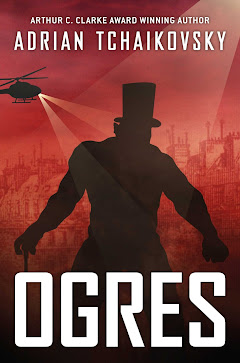Torquell lives in a world that looks beautiful, but under the surface is quite grim. He's a young man, an ordinary human, the son of the headman of his village, and will almost certainly be the next headman himself.
The headman's responsibility is to keep order in the village, keep things running smoothly, and above all, to make sure the village makes a good impression and can pat the required taxes when the Landlord comes to visit. The required taxe are whatever the Landlord says they are.
The Landlord is an Ogre. Bigger, stronger, more powerful, reactive emotions. Those appetites include eating meat, which just makes ordinary humans sick. Ogres rule the world, and humans serve them. Torquell, though, there's a little bit of rebellion in him. He's a bit of a lovable rogue, who pulls pranks and commits minor acts of vandalism--most of which are in the interest of righting some wrong that can't or won't be set right by the ordinary system of law and order. One day, Torquell's spirit of justice and rebellion collides with the latest visit of the Landlord. This time, the Landlord has brought his son and heir.
I don't want to say that the Landlord is a nice guy. He's not, at all. He is, however, a practical man, who does not have his son's sheer, unmotivated meanness. Torquell's meeting with Sir Peter's son, Gerald, is a disaster for both of them.
It's also the start of what the (second person, present tense) narrator tells us is Torquell's hero's journey. Torquell was never much interested in the book learning required of him as the headman's heir, but that's a matter of interest, not ability. He's smart, tough, and he really tries to do the right thing. In a twisted sort of way, things tend to work out for him. Yes, he becomes an outlaw, but he survives and learns new skills. Yes, he's caught by a bounty hunter, but that ultimately leads to him becoming part of the household of a very different ogre, where he is slowly prodded to become interested in book learning and big questions.
Big questions like, where did the ogres come from. The answer is fascinating, and horrifying, and, it turns out, this is actually the wrong question. When he figures out the right question, it's the start of Torquell becoming the surprisingly effective leader of a rebellion against the ogres.
But does he have the ability and the character to bring it to a successful conclusion?
This doesn't sound like all that grim a story, does it? For most of the novella, the tone doesn't sound grim. I could point you at books of overall grim tone that don't include the nasty features of this one. The tone doesn't match, for me, the fact that there are two prominent instances of cannibalism, ogres eating humans, and it's indicated to be a fairly common practice. And no, the reader isn't supposed to approve of or even accept it. It's one of the clues to what the world run by ogres is really like.
There's the peaceful, beautiful, bucolic world of the villages, and pre-OSHA, pre-union factories that exist that way because the ogres explicitly want them to.
I'm not sure I'm articulating well what creeped me out about this novella. There's also, of course, the fact that I don't like stories that, um, how to put this without spoilers. I don't like stories where the protagonist's character arc winds up where this one winds up.
It's well-written. It's just not written for me. And it doesn't have the characteristics that cause me to regard some other stories I don't personally like as worthy Hugo finalists. There's just none of that added value that makes me respect the story despite not enjoying it.
It's not even the political subtext, which is there, though not overly blatantly. On that basis, it actually winds up making a point I completely agree with. Nevertheless, the overall effect for me is just--icky.
I received this story as part of the 2023 Hugo Voters Packet.

No comments:
Post a Comment